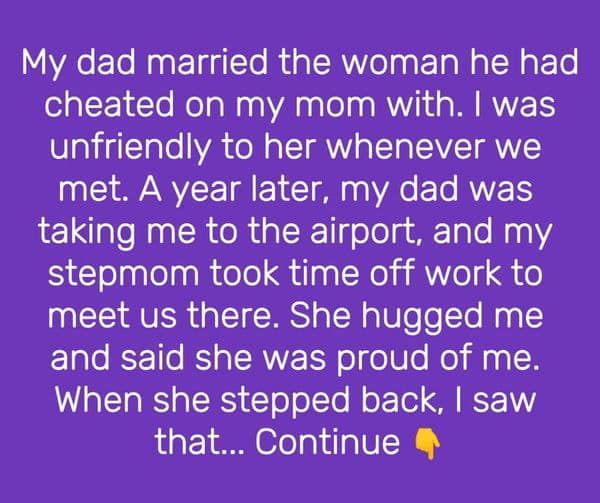Stepparents often have a tough job. They deal with misunderstandings, worries, and sometimes even rejection. But through it all, they stay committed. Over time, they learn how to build trust, create new family traditions, and move from “step” to “parent” in ways that make a real difference.
The Story:
In my junior year of high school, my dad married the woman he had cheated on my mom with years earlier. As a moody teenager, I wasn’t happy about his new marriage and was usually distant and cold toward her when we saw each other.
A year later, my dad was driving me to the airport to go to college, and my stepmom took time off work to meet us there and give me a care package. She hugged me and told me she was proud of me. When she stepped back, I saw tears in her eyes.
At that moment, I realized she wasn’t a bad person, even if she (and my dad) had done things wrong in the past. Our relationship got much better after that, and now she feels like a second mom to me.
Stepparents often walk a challenging path, balancing the demands of parenting with the complexities of building trust in a family where bonds are already well-established. They encounter misunderstandings, doubts, and sometimes even outright rejection. Yet, they continue to persevere, gradually working to bridge gaps, establish new family traditions, and—if they’re lucky—transform the “step” in their title into “parent,” forging a deep connection that transcends any labels.
For me, the journey with my stepmom began in my junior year of high school, a time when emotions were already running high. My dad had just married the woman he had cheated on my mom with years before. It was a choice that felt like a betrayal all over again, and, as a teenager, I struggled to understand and accept the situation. Although she made efforts to get to know me, I remained aloof and kept our interactions short, convinced I had no reason to warm up to her.
Then came the day I left for college—a milestone moment that, for many, represents independence, new beginnings, and, for the family left behind, a little bit of loss. My dad drove me to the airport, and I was surprised when my stepmom, who had taken the day off work, met us there. She handed me a small care package filled with snacks, essentials, and a note, each item showing that she’d thought about me and my comfort in the weeks ahead.
Before I knew it, she was hugging me, saying how proud she was of me, and wishing me the best on my new journey. As she stepped back, I noticed tears welling up in her eyes. In that instant, I realized something that had eluded me for years: she genuinely cared. She wasn’t defined solely by her mistakes or my dad’s choices. She had made efforts to be in my life, even when I had been distant and unkind. She was standing there, vulnerable, and full of love and hope for me.
In that one moment, the walls I had built around myself began to crumble. I saw her, perhaps for the first time, as a person who could be more than my dad’s new wife. She could be a friend, a mentor, someone who would support me. My perspective shifted, and from that day forward, our relationship started to improve. Slowly, I allowed her into my life, accepting her as someone who, despite her past, genuinely wanted to be there for me.
Over time, our bond strengthened, and we formed our own traditions—baking together during the holidays, sharing books, and exchanging long phone calls. She became a source of comfort, someone I could turn to with the kind of advice that only a mother could give. Eventually, she came to feel like a second mom, not just because she married my dad, but because she earned my trust and respect through patience and kindness.
Looking back, I realize that her journey as a stepparent couldn’t have been easy, especially knowing that I held resentment toward her. Yet she stayed, tried, and opened herself up in ways that made a difference. Our story is a reminder that while the role of a stepparent is never simple, the dedication to bridging gaps and healing wounds can lead to connections that make family more than a matter of blood—it’s about love, patience, and the willingness to start anew.
